 Home > CR Interviews
Home > CR Interviews CR Sunday Interview: Ruben Bolling
posted April 8, 2012
CR Sunday Interview: Ruben Bolling
posted April 8, 2012

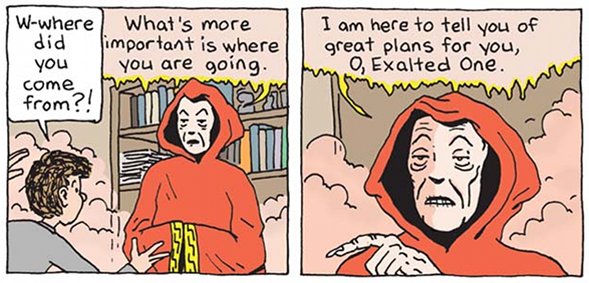
*****
There's a moment in the interview that follows where
Ruben Bolling (real name
Ken Fisher) talks about the virtue in nailing the joke in each installment of
his long-running Tom The Dancing Bug. He does so in a way that makes me hesitant to make a big, complicated deal of this introduction. One of the great things, and maybe
the great thing, about Bolling is that his work is consistently funny. The definition of a working cartoonist over the last two decades, Bolling delivers a fine joke or trenchant observation more often than he does not.
Tom The Dancing Bug makes me laugh, and Bolling is right to assert this as perhaps its sole, defining virtue. That should be enough. It is enough.
Still, one thing I've grown to appreciate about Bolling is how poorly he fits into a premeditated niche, or, if you prefer, how his work has become its own thing independent of delivery system. That isn't always the case with funny people. If you think of other comics humorists, they tend to work really well within a specific kind of traditional comic slot.
Ernie Bushmiller's Nancy is almost the platonic ideal of a gag strip, for example. Bolling has managed to stay funny without any kind of traditional home -- even a "new traditional" one. I like that he's just basically done what he's done, and then found a home for it. When the work has shifted somewhat to encompass different concerns in Bolling's life,
Tom has remained as true a vehicle as ever; ditto its appearances on-line in a variety of Internet homes, and with its print partners. I have to imagine the last thing on the cartoonist's mind is how his work displays an encouraging model of putting one's work out there and letting the readers come to you, but there it is.
I'm very grateful for the time the cartoonist-writer took to complete the following. We had meant to talk for the Holiday Interview series, but that was before I knew I was going to have to start compensating for memory loss and didn't write it down. I forgot we were going to interview, which is strange only in that I rarely forget to seek out new
Toms. I'm thankful for Bolling's patience, consistency and perspective, all of which are on display below. -- Tom Spurgeon
*****
TOM SPURGEON: We tend to link cartoonists to their primary venue -- "comic book artist" or "strip cartoonist" -- but it strikes me that you don't have a lot of company doing exactly what you do, how you do it. How would you describe your primary place in comics? Do you envision your work as separate as, say, something that appears on Boing Boing
or in syndication?
RUBEN BOLLING: Tom The Dancing Bug is definitely an oddball thing. It's a comic strip that is syndicated in newspapers, but it's weekly, large-format, sometimes political and also appears prominently and separately on the web. It's shaped like a comic book page, and uses many different styles, often evoking the styles of comic books, such as superhero comics and funny animal comics.
Also my humor style does not really come directly from cartooning, but from television comedy.
I guess all this reflects the idea I had from the very start of the strip: I wanted to do it all. I wanted to be every cartoonist, and I didn't want any restrictions on what I could do. This probably means I don't have a set place in comics. My annual convention is very small; it takes place in my kitchen, and one beer is served.
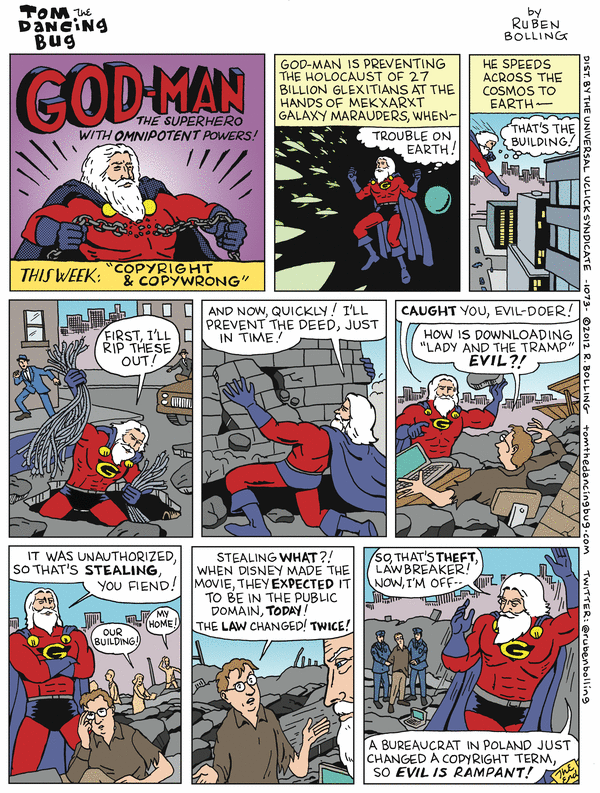 SPURGEON: [laughs] The
SPURGEON: [laughs] The Boing Boing
venue that you have, now that you've been there for a while, what's different about being published through them rather than some of your other homes, past and present? Is there a different audience? Do you feel presented in a different way or with different elements emphasized?
BOLLING: I think of
Boing Boing as just one of my clients, but a really, really important one. First, they have such a vast and enthusiastic readership. And when I say enthusiastic, I mean it both in the sense that they are very engaged, but also the vibe is very optimistic and positive.
Boing Boing generally doesn't point out things that suck so they can be snarky and superior, they point out things that are awesome. You get the feeling this group could save the world with technology, steampunk and unicorns.
It's also been great to be on
Boing Boing because the people who run it are unbelievably inclusive and energetic. After being interviewed on their podcast,
Gweek,
Mark Frauenfelder invited me to become a co-host -- which I can only manage to do about every other week, but it's been a blast -- and I'm doing a t-shirt with them, and we're talking about a co-venture on a book, etc. I even attended a
Boing Boing meet-up that was a lot of fun. It really feels like I've joined a really fun and adventurous community.
But I also just started on
Daily Kos, and I have high hopes for a very different audience, building on that momentum. It's so cool that I just did
my first Super-Fun-Pak Comix installment that appeared on that site, and even though the site is exclusively about politics, it was really well received. And I'm so excited to join what Tom Tomorrow's built there, with a great group of cartoonists, many of whom are old pals.
 SPURGEON: How do you look back on all those years with Salon now? Is there any lingering confusion on your part as to why your work -- which was popular with them -- was cut loose? Was the time spent trying to find a new, primary home a tense one?
SPURGEON: How do you look back on all those years with Salon now? Is there any lingering confusion on your part as to why your work -- which was popular with them -- was cut loose? Was the time spent trying to find a new, primary home a tense one?
BOLLING: My warm experience at
Boing Boing for a year and a half is in stark contrast to
Salon, where the strip ran for 15 years. I'm so grateful for that run, but, aside from their great first editor,
David Talbot, I never had a meaningful conversation with anyone there, ever. And that includes the parties -- on the rare occasion I was invited -- I felt like an interloper in an office party, which I guess I was.
I was always listed among the most-read features, so I was confused when they let the strip go. They even told me at the time that my traffic was great. Of course, it was part of a purge of all comics; Carol Lay and Keith Knight were jettisoned before me, and Tom Tomorrow left not long after.
Trying to find a new home was extremely tense. Financially, it didn't make that big a difference in my life, but I felt that it was essential that the strip have a prominent, audience-building web presence.
SPURGEON: You've been on-line generally for a really long time now, although your work precedes that being a primary home for it. Do you feel that's been a boon to your career, its accessibility on-line? Is there a part of you that would have preferred a shift to a earlier window for your career, with print as the primary driver?
BOLLING: Being on the web really early --
Salon picked up the comic I think in 1995 -- was great in some respects, but it also hurt me because until
Salon dropped the strip, my entire web strategy was:
Salon. And that complacency on my part was not healthy or productive.
But basically the web is a double-edged sword. On the one hand, it's made me much more well-known than print ever has. Especially now that I'm on
Boing Boing. On the other hand, the web has been replacing print exposure without sufficiently replacing the income that comes with print. The challenge for all transitioning print cartoonists is to figure out how to leverage that "fame" (in quotes, because it is just web-fame) into dollars.
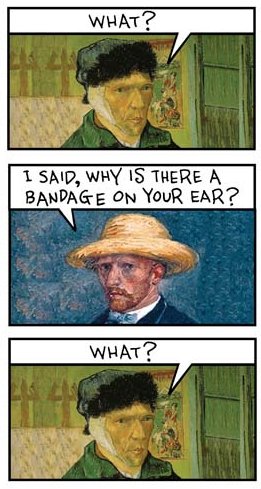 SPURGEON: Has the social media aspect to being on-line made a difference at all for you? I know that you tweet, and you have a modest but not overwhelming number of people that follow you that way.
SPURGEON: Has the social media aspect to being on-line made a difference at all for you? I know that you tweet, and you have a modest but not overwhelming number of people that follow you that way.
BOLLING: "Modest but not overwhelming?" That's not even damning me with faint praise, but more like damning me with damning. [Spurgeon laughs]
For years, I resisted social media because it really went against my whole philosophy as an artist -- I think the work should speak for itself, and I try to keep myself out of the spotlight. I hide behind a pseudonym, I do few interviews, and at one point I realized I may be the only cartoonist I know who's never drawn himself in his work.
But I realized a couple of years ago that this purist philosophy doesn't work today, and you've got to sell yourself as well as your work. It wasn't until I found Twitter relatively recently that I really embraced social media -- I actually now find that a lot of fun.
I'm now doing a lot more stuff like that, but in some ways I'm still not all that comfortable with it. I always have this fear that if I pull back the curtain, the audience will find out that the cartoonist behind the comic strip is just some guy.
SPURGEON: Do you still work just the one evening a week, and is that still a process you enter reasonably cold in terms of having prepared material before you sit down to work? How would you say your work over the years has been determined by the way you're able to produce it? Would you be a different cartoonist if this were your sole gig, or if you were constantly working on material just to get it out the door?
BOLLING: Oh, I've never sat down at the drawing table without an absolutely complete script, and some idea of the look of each panel. I may change a word or two while I'm drawing/lettering, but I'm not an improviser.
But I sort of cling to the somewhat romantic notion that the comic writes itself, and I have very little control over its content. I know that's not really true, because on other projects I have plenty of control over the tone and subject matter of my work, but I allow
Tom The Dancing Bug to flow somewhat organically. And now I'm not sure if anything I just said is true.
SPURGEON: You've mentioned in the past that you've been dissatisfied with elements of your cartooning, such a relative tightness to some of what you draw. How rigorously self-analytical are you about your comics? How are you different now as a cartoonist than you were ten years ago?
BOLLING: I honestly think I'm somewhat less ambitious as an artist than I was ten years ago. I used to put a lot more thought, and work, into each panel, and now I sort of know how the panel should look, because I've done lots just like it, and just get it done.
While I'm pretty confident in my writing, I'm very critical of my drawing, and that's the aspect of my game where I feel like I'm cheating and bluffing. I think the comic would be so much better if I could draw the comic I have in my mind rather than the one that comes out of my pencil.
Almost all of my non-
Tom The Dancing Bug plans involve writing and not drawing, including TV writing.
 SPURGEON: Your big interview with
SPURGEON: Your big interview with The Comics Journal
in 2001 and 2002 made a definite point of you doing more political work. That seems to have continued, and I think it makes for some of your best cartooning. Was there a process for you in trying to figure out how to do more political work? Are you happy with those cartoons when you do them generally; do you think you've found your voice there? When that works for you, what works about it for you?
BOLLING: I started doing political work just because I found it as another way to be funny. Before I was a cartoonist, I was about as apolitical a person as you could find.
But it's true that after 9/11 and Bush's reaction, this changed on a visceral level. I began doing political installments not only much more often -- like, always -- but with real anger and passion.
But ultimately, I always know that what makes a good
Tom The Dancing Bug is not a comic that vents my anger, or even one that makes an "important" point. It's one that is funny and interesting by saying something in a new way.
When I'm writing anything, whether it's a comic strip or a TV script, there's this rare, magical moment when what I've written surprises me. I didn't just write from point A to point B, but suddenly L showed up, and I didn't see it coming. That's just the very best feeling, and trying to find that high again is absolutely the reason I'm a writer/cartoonist.
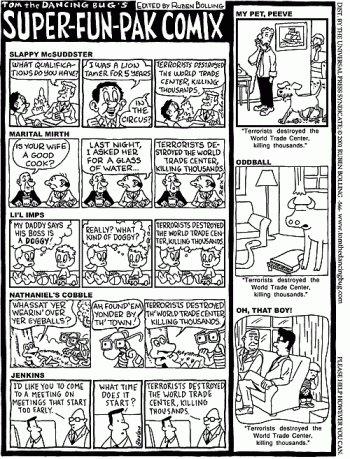 SPURGEON: Did the tenth anniversary of 9/11 bring you to any reflection on that event's impact on your cartooning? I thought a lot of your work was terrific in the weeks and months that followed. Also, in general, do life events tend to have a drastic effect on your work, maybe stuff that happens that we all don't share in?
SPURGEON: Did the tenth anniversary of 9/11 bring you to any reflection on that event's impact on your cartooning? I thought a lot of your work was terrific in the weeks and months that followed. Also, in general, do life events tend to have a drastic effect on your work, maybe stuff that happens that we all don't share in?
BOLLING: 9/11 had a huge impact on my cartooning. I remember that for months it seemed bizarre to me that I would write about anything else. The first time I eventually did do a comic of general humor, even though I felt the time was right, I sort of cringed when I sent it out.
But I generally keep my personal life events separate from my cartooning world, although of course some things leak in, consciously and unconsciously. Years ago, after a horrible and tragic life event, I wondered whether I could ever write a comic again, and I certainly didn't want to. I took a week off, then gave it a half-hearted try, and was shocked when I was done that I'd created a totally off-topic silly comic about one of my recurring characters, Bob, that was a solid B+ comic. I was genuinely amazed that my ability to write a comic strip seemed totally independent of my mood or frame of mind.
SPURGEON: One thing I seem to remember about you is that you're a parent, and I know that when I talk to cartoonists that mine certain material about their lives and attitudes they tend to tell me that seeing their kids go through things brings a different or at least an added perspective. Has that been true at all with raising your kids; do you re-see things through their eyes?
BOLLING: Being a husband and a father is the most important aspect of my life, and the one that gives me the greatest joy, but if that's manifested in my comics, it's certainly very subtle.
Thinking about it carefully, one example: I wonder whether I would have come up with my
Lucky Ducky character if I hadn't been gearing up for something I greatly anticipated, introducing my children to kids' comics, including
the Carl Barks Donald Duck comics.
But while re-seeing things through my kids' eyes has been a thrill for me personally, but I'm not sure it's had much of an impact on
Tom The Dancing Bug.
 SPURGEON: I like your parodies, your gently satirical pieces that count on a certain visual, and I think you have a natural grasp on what makes some art styles pop. Is there anything you think you've learned about why certain kinds of visual shorthand work, why [Jack] Kirby works a certain way, or [Will] Eisner, or certain bigfoot styles?
SPURGEON: I like your parodies, your gently satirical pieces that count on a certain visual, and I think you have a natural grasp on what makes some art styles pop. Is there anything you think you've learned about why certain kinds of visual shorthand work, why [Jack] Kirby works a certain way, or [Will] Eisner, or certain bigfoot styles?
BOLLING: Really, the only time I get excited about drawing a comic is when I have an idea that requires me to evoke the look of a certain cartoonist. Sometimes, say when I'm drawing a "God-Man" comic, I'll have the idea that a certain panel should look like Kirby or Eisner (both of whom I use a lot), or
Curt Swan (who is so underrated, and particularly appropriate for God-Man). And I'll do it in their style, even though it's doubtful anyone but me would ever realize or notice.
I know that aping other cartoonists has been a great education. Sometimes it's not until I really study a Kirby drawing for the purposes of getting his style right, that I'm struck by the raw power and majesty he can evoke with just the right
pose. Studying
Hergé (for "Billy Dare") and Barks has been a blast, and has really stepped up my game for all of my comics.
I just had a week where I had to do some
Dr. Seuss-style art for
a comic about the Lorax movie, and I just did
a week guest-cartooning for Richard Thompson's great comic strip Cul De Sac. Both were great fun because their loose, almost improvised inking style is so different from my natural style.
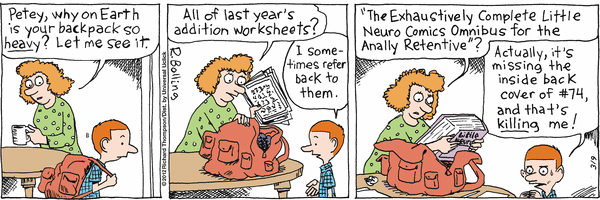 SPURGEON: Do people still have the same reaction to the fact that you engage religion to which you expressed some frustration to Kent Worcester back in 2001? I wonder if the dialogue there has lightened up or coarsened.
SPURGEON: Do people still have the same reaction to the fact that you engage religion to which you expressed some frustration to Kent Worcester back in 2001? I wonder if the dialogue there has lightened up or coarsened.
BOLLING: Well, there's less blowback on all my "controversial" comics, because the strip is in fewer daily newspapers. They won that war, but it was a war of attrition.
SPURGEON: [laughs] Berke Breathed before leaving the field again offered up an observation in a few places that he regretted on some levels the crowdedness of cultural and political commentary, that it's a different ballgame when you're doing satire alongside MAD and when you're doing it alongside MAD
, The Daily Show and a hundred high-profile others. Has the context of similarly-focused efforts changed at all for your work, do you think? Are audiences more sophisticated now, for instance?
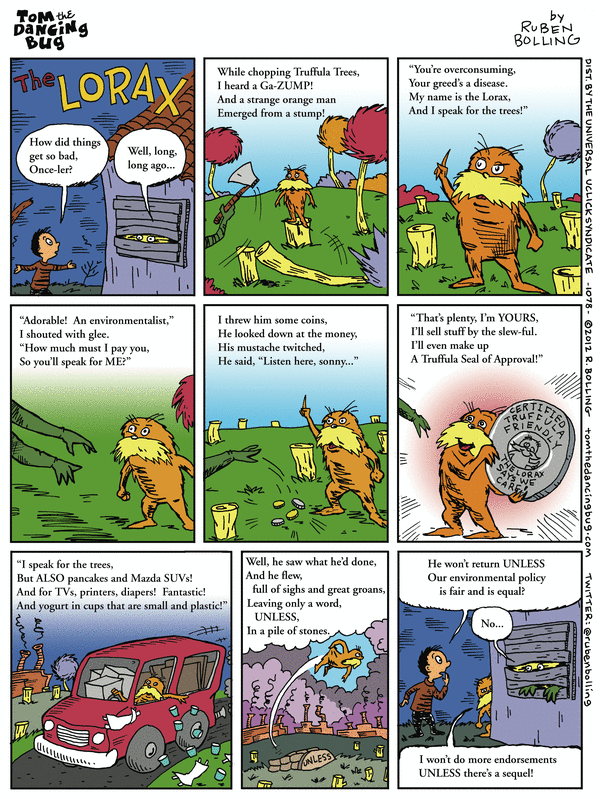 BOLLING:
BOLLING: No doubt, there's much more competition, and a much shorter cycle. This
Lorax comic I just did is a good example. I couldn't believe the Lorax was being used to endorse things like SUVs, I tweeted about that on a Monday, then decided my next comic would be on that subject. As I took my sweet time writing the comic, I started to see some online attention to this issue, then on Friday, it was the lead story playing on the news on my radio alarm when I woke up, and I started to panic. Then saw that
Colbert had done something on it.
I refused to give up on the issue, so I drew it up a few days early, and posted it on
Boing Boing on Monday instead of its normal day, Wednesday. After all these years, I think I have a good sense of the right timing on this stuff, and I could feel the window on this comic closing real fast.
SPURGEON: One thing I thought was funny in something I read is you castigated an early George Bush Sr. cartoon, but it was a cartoon that you not only did but that I believe you collected, and it seems to me if you were dissatisfied you could have culled it. Do you think about a legacy for your work? Do you have a sense of what's worked and what hasn't and any desire to make a case for what you've done well?
BOLLING: I'm not sure which comic you're referring to, but my first book was published in 1992, and I'd only been a professional cartoonist for two years. I was insanely lucky to get a book contract at
HarperCollins that early in my career, but that meant the book contained
everything I'd
ever done. I literally could not take out a page.
The nature of this kind of cartooning is that you really don't think about any legacy. You do a comic, and the minute you're done you (and the readers) only care about the next week. That's a relief when I do one I'm not too proud of, but when I do one I like a lot, and gets a lot of praise and attention, I really resent that I only get to live with it for a few days. I'm always jealous of musicians who get to tour the rest of their lives on their hits, with the ability to make people happy every single night with something they've written years ago.
SPURGEON: There's a very human, curious, skeptical and even practical undercurrent to your work, a sensibility that emerges when you read a bunch of it at once. How important is it to you that people get the entirety of perspective that you bring to a subject? Are you okay with people just laughing at the gag?
BOLLING: I'm really glad that you found an overarching sensibility in my work -- and that it reflects positive attributes -- but really, my only goal is to get the reader to laugh at and/or enjoy each individual comic, one at a time.
In some ways, I view a sensibility or consistent themes emerging from reading many comics at once as a failure of imagination. It means I wasn't able to keep each comic different enough.
SPURGEON: I noticed your name in Ken Fisher form being used to mark your participation in the Cul De Sac
strip roundtable of creators being used while Richard is sick. You've talked a lot about what the nom de plume
did for you early on, but has having one that's so loosely applied had special uses over the year?
BOLLING: Ugh. No, I try to keep the pseudonym strictly applied for all public purposes, but that was the result of a mix-up at my syndicate. And now I'm being asked about it in an interview. The pseudonym thing has been a giant pain, and I wish I could get
my time-traveling character Percival Dunwoody to go back to when I decided to use it (I was a teenager!) and tell me to
cut it out!
SPURGEON: Are you a stable cartoonist, do you think? Are you set up in a way that you can go several more years? Why will you finally quit?
BOLLING: Well, I've never intended
Tom The Dancing Bug to be the only thing I did; I've always done other things. I live my life, and then a strange byproduct of that life is that I emit this weird comic strip once a week. So I guess I'll stop if and when the things that come up in my life crowd
Tom out.
*****
*
Tom The Dancing Bug at GoComics.com
*
Tom The Dancing Bug at Boing Boing
*
Tom The Dancing Bug at The Daily Kos
*****
* all art from
Tom The Dancing Bug, hopefully employed in responsible, clear, contextual, illustrate-a-point fashion. Except maybe that last bit below, which I stole because it made me laugh.
*****

*****
*****


